Doug Myers passed away July 2, 2024.
CBF is heartbroken to announce the news of Doug Myers’ passing. Doug was a beloved colleague and friend. He served as the Foundation’s Maryland Senior Scientist for nearly 12 years where he fiercely advocated for Bay health and environmental justice. His kindness and love of the outdoors was infectious, and his legacy of environmental stewardship will have a lasting impact for many generations to come. We are incredibly grateful for Doug’s dedication to the Bay, and we will miss him deeply.
More information can be found in Doug’s obituary.
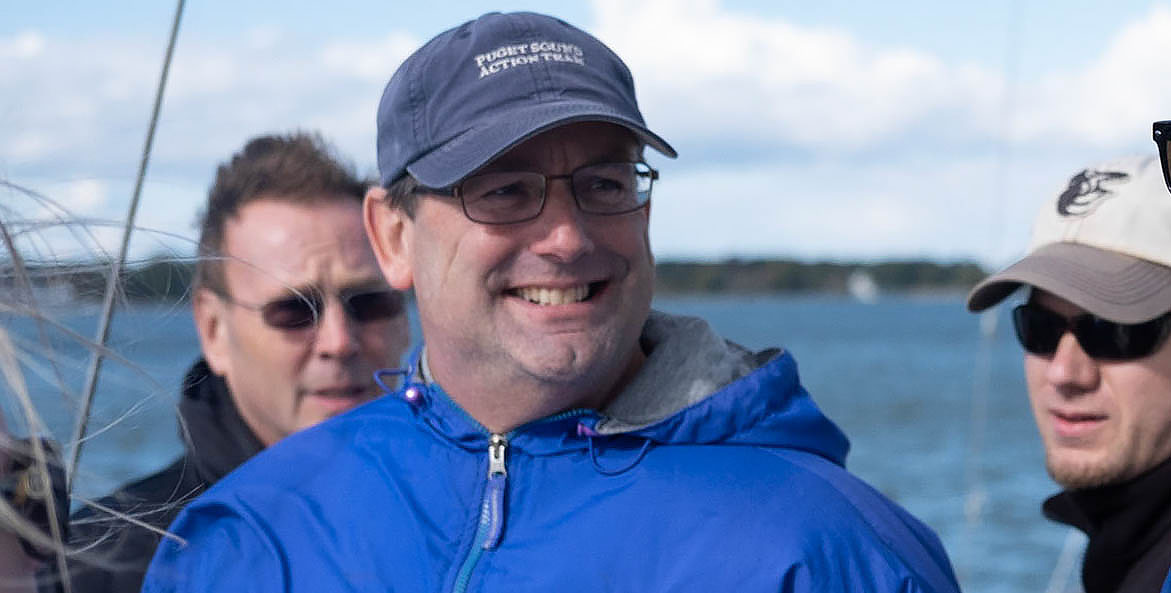
CBF Staff
We are heartbroken to learn of the passing of our beloved friend and colleague Doug Myers on Tuesday, July 2. CBF's Maryland Senior Scientist, Doug devoted nearly 12 years of his life to fiercely advocating for the Bay's health and the communities that are connected to it. Affectionally referred to as the "fire-in-the-belly guy"; by some colleagues, Doug tirelessly fought for clean water. An incessant tide pool explorer and life-long learner and teacher, Doug's impact was great.
Prior to his time at CBF, Doug served in many roles, including as a fisheries observer out of Dutch Harbor, Alaska; an environmental educator at Armand Bayou Nature Center in Pasadena, Texas; and a scientist at Washington Department of Ecology, Puget Sound Action Team, and People for Puget Sound in Olympia, Washington. He also was an integral part of Restore America's Estuaries (RAE) for decades, lending his extensive scientific knowledge by serving on program committees, presenting at the RAE Summit, and helping RAE, CBF, and other partners implement coastal restoration projects as far afield as Nova Scotia. Doug had a wide range of passions and interests and also served as a youth counselor, sang in several choirs, drummed with Planet Percussion in Olympia, and served on the boards of the Nisqually Reach Nature Center and Sound Action in Washington.
His love of the outdoors was second only to his love of life. Recently Doug's friends and colleagues gathered under the tree on the beach at CBF's Philip Merrill Center. There, along the Bay's shoreline, they shared stories and reflections of our friend Doug. Then and now, the tributes continue to overflow, a testament to the tremendous person he was. Here are just a few:
To say Doug was an important part of the Maryland Office team and even all of CBF would be an enormous understatement and a disservice to all he has brought to our work, our mission, and our team. From his homemade wine to his bongo skills and love of gardening, Doug was more than just a colleague or teammate. Doug embodied what it means to be a passionate advocate for science and the Bay.
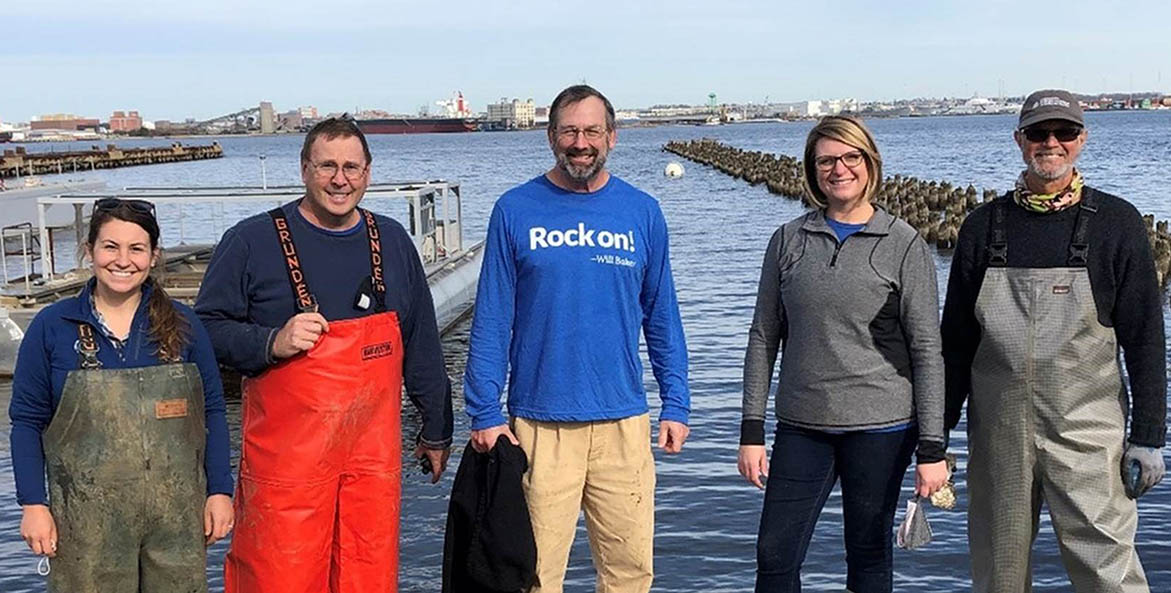
Members of CBF's Maryland Office in the field.
CBF Staff
Doug's impact on CBF and the larger conservation community was immeasurable. He was a staunch, passionate advocate for our issues and was well prepared for any hearing, public comment period, or partner meeting . . . Doug also was the first to tell you to go outside and experience the resource, or talk in the lunchroom with your coworkers, or take that vacation you had only dreamed about.
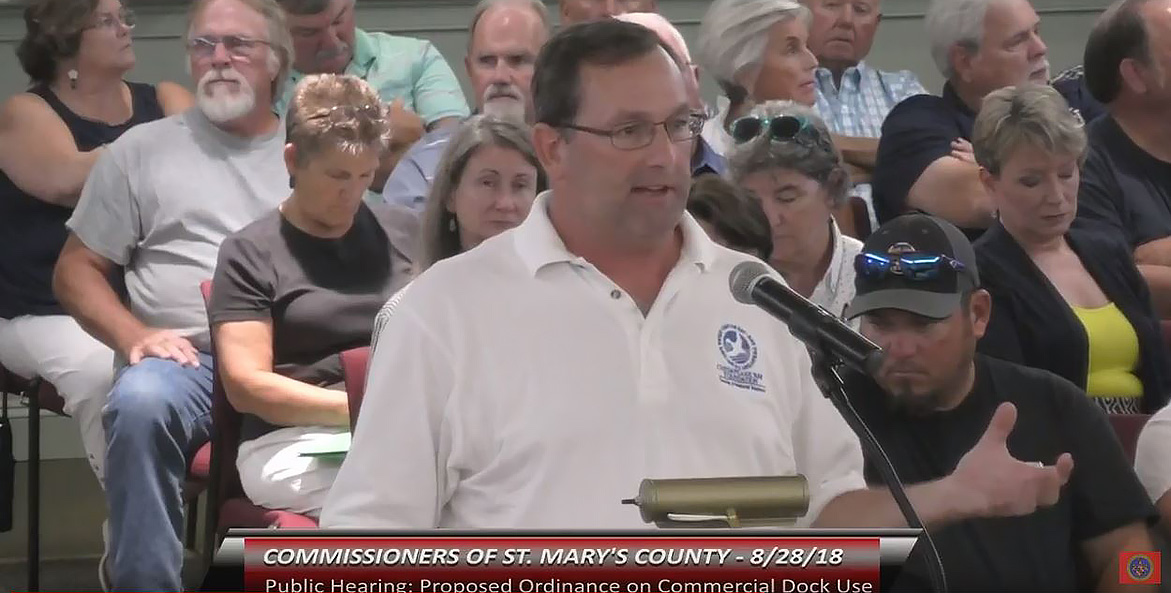
Doug Myers presents testimony at a St. Mary's County hearing.
To me, Doug was a relentless advocate in all the best ways—committed to science, tough on problems, clear-eyed about how much needs to be done. There was only one thing bigger, bolder, more uncompromising than his work: his heart. Doug radiated joy. Despite the setbacks that come with this calling (and there are many), he marveled at eelgrass. He delighted in joining a team. He crowed about progress. To be near all this was to feel lighter and become better at everything we were doing.
Doug was a mentor and a friend and almost a guru to me, between his ability to calendarize his priorities, execute on everything, and deliver the harshest criticism to senior government officials, all with a smile. We had lunch during Session, he had on one of his trademark happy tie-shirt combinations and was bubbling over with enthusiasm and hopefulness in me even as I was feeling listless and lost between moments in my professional career. Doug knew how to enjoy life. Working alongside Doug was the most joyful motivating experience. We shared a space, facing away from each other in a cubicle. So we'd work, and then turn towards each other to talk throughout the day. My strongest memory of Doug is seeing him in profile, sitting at his desk, reading some new outrageous data or reviewing a ridiculous regulation or discovering a fault in an established legal argument from within an archway of tropical plants, mostly grown from seed from various grocery store fruits he'd eaten and then coaxed into small trees at the office, and then wheeling around in his chair with a glint in his eye and a half smile, 'These guys...! You won't believe...! I have never...!' Doug reveled in the fight but mostly just wanted things to come right. I think he was a person who fell in love with the natural world over and over again, from stumbling upon a passion flower vine on CBF's walking trail, to living aboard a fishing boat in the Pacific Northwest, and that's where his passion for preservation derived.
As much high-level policy work he performed, Doug fundamentally valued a strong public response to environmental issues. He was thrilled to participate in a well-attended public meeting and his respect for the voices of all people, not just scientists or attorneys, shown through in those settings. He was also a tremendous mentor, who established a standing CBF internship at Franklin and Marshall, and I think providing opportunities for those students was close to his heart as a Pennsylvania native. He was much loved by interns, too: I recall one gushing, after a particularly long day where I believe Doug also changed a flat tire following an oyster restoration trip, that she had 'never met anyone who knew so much about so many things.' Doug mentored me on occasion, notably telling me that I needed a break, wise advice that I didn't take, much to my detriment. Even as I wasn't taking many vacations, he took us all with him via Teams as he made a cross-country trip during COVID and he told me about other trips with such vivid detail and enthusiasm, I almost feel like I went whale watching with Karen and Doug off the coast of Cape Cod when the seasons were changing so there were not only Humpback whales but also Right whales to be seen, and I still plan to follow in his footsteps there and other places he's recounted in stories. I will be thinking of Doug on those trips and so many other times, to have been one of the lucky folks to have met him, and spent time with him, is a gift and a lesson.
Doug was one of the most selfless people I've ever had the pleasure of knowing. I had the honor of getting to work with him closely with our oyster monitoring work. One of the joys of the bi-weekly call we had was getting to hear Doug talk because I always learned something and because you could tell he was always energetic and engaged . . . He was so good at connecting with and talking to people about anything and genuinely cared about anyone he was speaking with. I'll always remember that smile, and joy he had for life and working for CBF.
I have known and worked with Doug for nearly 20 years and he has been an integral part of the Restore America's Estuaries (RAE) extended family—working for RAE member groups (People for Puget Sound and CBF), serving on RAE committees, attending RAE Habitat Directors meetings, presenting at RAE Summits, and more recently as part of the RAE partnership with the Clean Foundation in Canada as we collaborated on restoration projects north of the border. This work led to many fun adventures as we traveled together to explore the coastal areas of the U.S. and Canada. He had an extensive knowledge of restoration practices and the biodiversity in the many places he lived and worked, and he was always willing to share that knowledge freely to help advance the cause. He cared so passionately for the coastal environment—he lived and breathed it—everyone he came in contact with could sense his passion and could not help but share his child-like excitement at finding a healthy native plant or thriving oyster bed. I feel very honored to have been able to call him a colleague and even more fortunate to have called him a friend—but with Doug there was very little difference. His larger-than-life personality, big hugs, and love of nature will be remembered fondly and missed greatly. The RAE family was better for having him in it and will not be same without him.
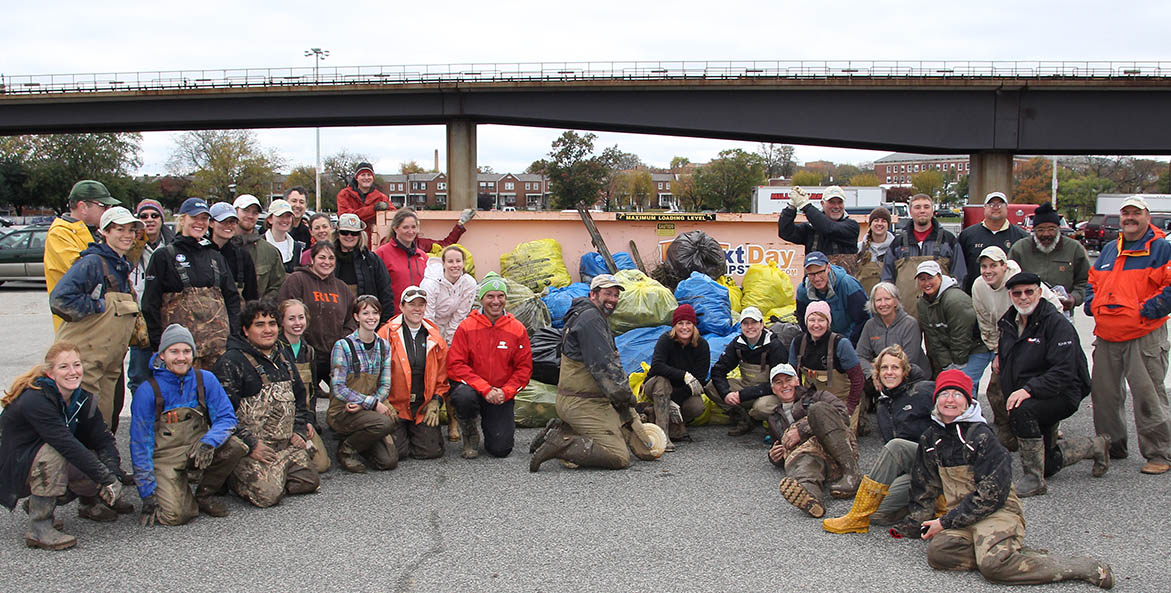
A clean-up event along the Anacostia River in Washington, D.C. during the Restore America’s Estuaries 2014 Coastal & Estuarine Summit. CBF's Doug Myers is front and center.
George Hatcher
When RAE launched a partnership to help the Clean Foundation in Nova Scotia create a coastal restoration program, we instantly decided we needed to bring Doug into the project. He was well known and highly respected within the RAE network—and the entire coastal community—for his vast knowledge of pretty much anything related to coastal habitat and restoration. I had met him before, but it was through this project that I really got to know him. During multiple trips and numerous meetings, the thing that always struck me was how he was both this brilliant, deeply knowledgeable scientist and also very much a fun, outgoing, 'regular guy.' It's an unusual combination, and I recall being awed at how the same person who had woken up early to go down the waterslide in the hotel pool at least a dozen times would later that day absolutely take over a project planning session by laying out ideas and information that perfectly addressed the questions at hand. With his great passion for and knowledge of seemingly everything related to his work, and his engaging, enthusiastic personality, Doug frequently seemed to really be larger than life. Yet, he was also thoughtful and approachable, a great colleague and resource for countless people over the years. His impact on both the broader world through his professional accomplishments and his smaller world through his connections with those around him are immeasurable and will be long remembered.
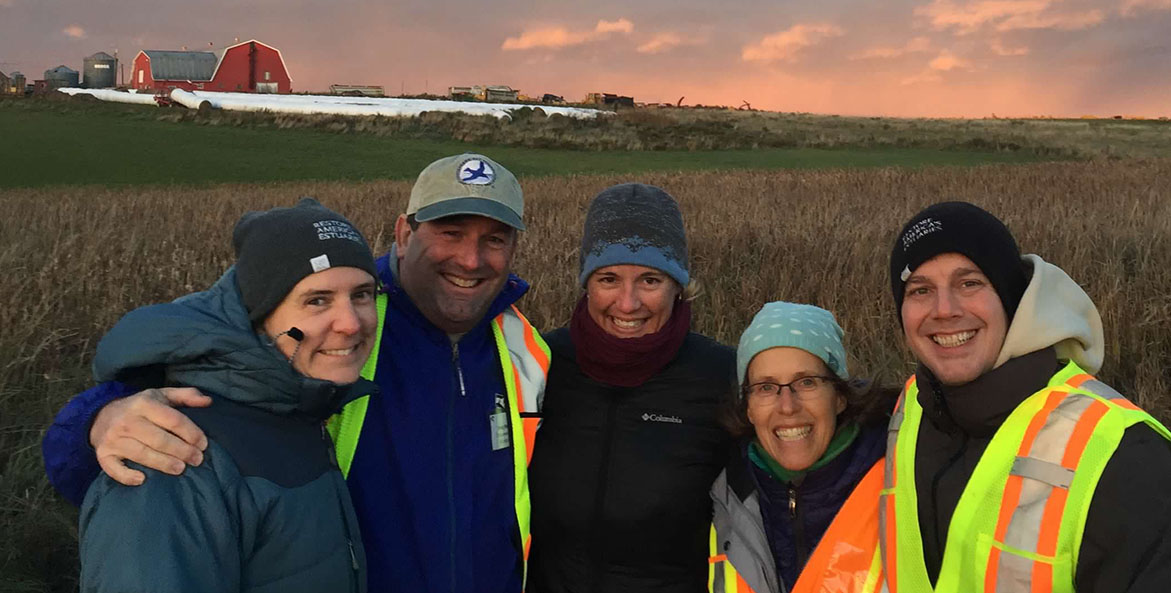
Doug Myers, second from left, with colleagues in Nova Scotia.
Doug's Posts
-
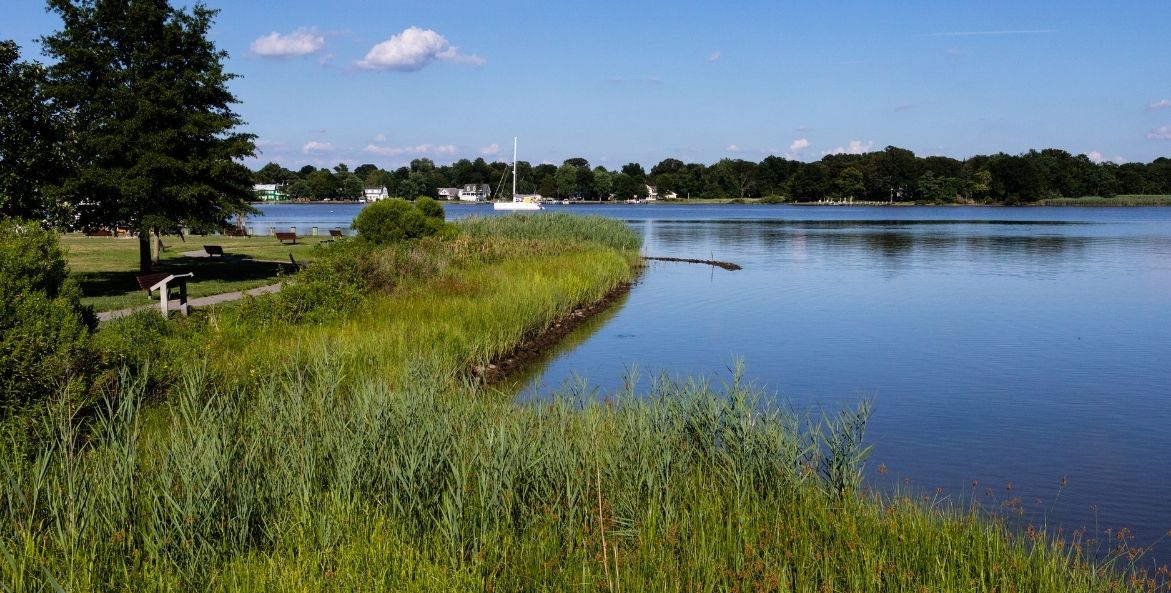
Successful Shorelines Require a Sea Change
September 15, 2022
Living shorelines of native plants are often more effective, and more cost-effective over the long run, than armoring shorelines with rocks, concrete or treated lumber.
-
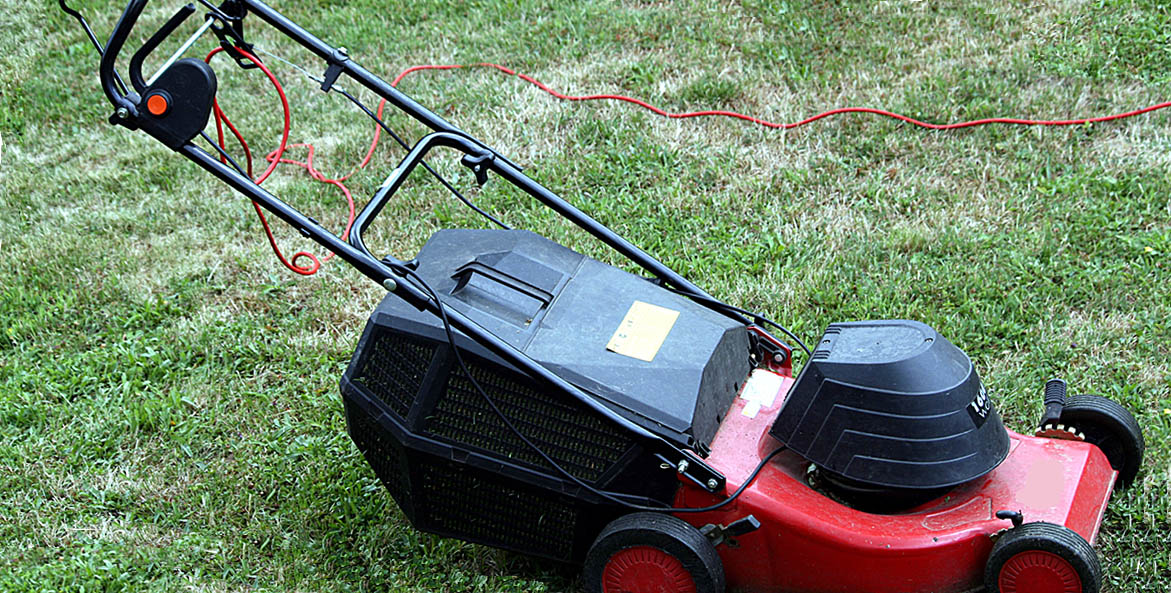
Electrify Your Lawn Care to Help Save the Chesapeake Bay
May 6, 2022
Switching from gas-powered to electric lawn and garden equipment significantly reduces air pollution that contributes to smog—a major threat to human health—and the nitrogen pollution that harms waterways.
-
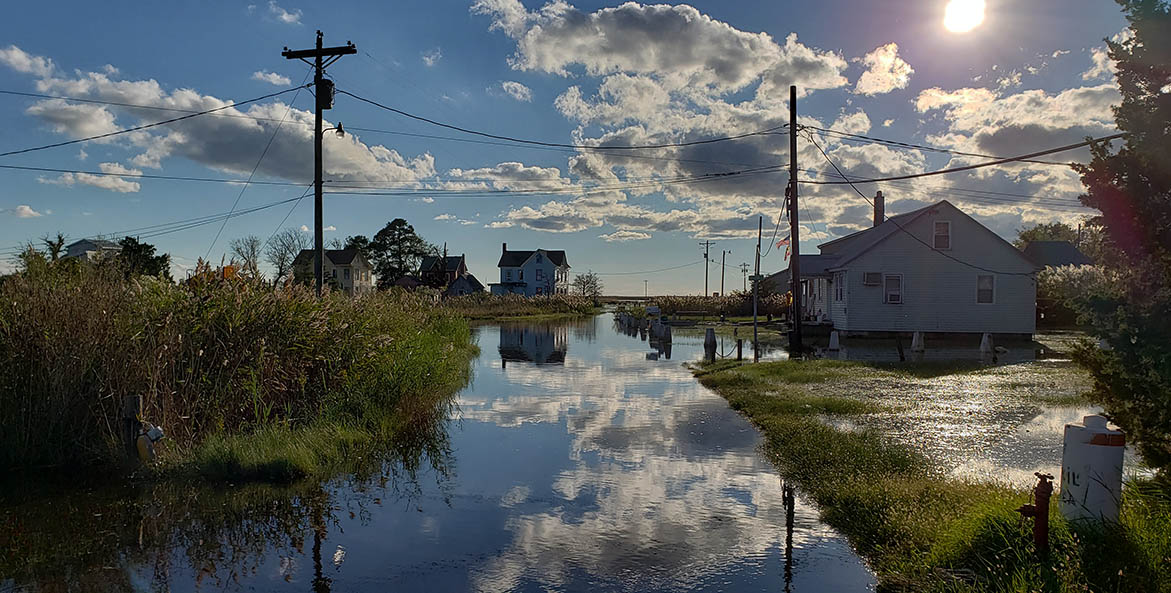
Let's Choose Nature Over Higher Flood Walls
October 5, 2021
How we adapt our built infrastructure in the Chesapeake Bay region to the challenge of sea level rise needs to be at the forefront of climate change discussions.


